Re-Legalizing the Casinos of Ecuador
Five years ago, El Supremo convinced the voters of Ecuador to close all 32 casinos nationwide. Only 46 percent of those voting on the referendum issue supported the casino ban, yet that was a narrow plurality and enough to shutter the gambling parlors. The last of the existing casinos closed in March of 2012.
Permanently closing existing casinos had never happened anywhere in the world since the casinos of Cuba suddenly closed in the late 1950’s. It took Fidel Castro’s Cuban revolution to make that happen.
Russia closed its casinos for awhile, then re-legalized casino gaming in specially-designated districts a few years ago.
Now a human-rights lobbyist in Ecuador has re-ignited the issue, calling for re-legalization of casinos in La República.
Francisco Zambrano Campuzano, the head of CEDHUS -- the Human Rights and Union Commission of Ecuador -- says over 200,000 Ecuadorians lost their employment due to the casino closures. Not just casino employees, he says, but workers in many industries supported by the existence of casino operations.
“Gambling as a form of entertainment exists in every part of the world,” he says. “In Rome and even in Jerusalem, there are gambling parlors."
Zambrano says that in light of the “unprecedented economic crisis" in Ecuador, the cash-strapped government should bring back the casinos.
CEDHUS says it will take the issue to the U.N. Human Rights Commission, if necessary.
Sources: the Casino Review website and yogonet.com ...
-- cccmedia in Quito
I would think that expanding eco-tourism would be a much brighter option. The logic is certainly problematic, i.e. everybody else is jumping off of bridges; therefore so should we. Why were the casinos closed? Because they were closely correlated with human rights abuses, child malnutrition and poverty, substance abuse addictions, prostitution, theft, etc. I hope someone exposes this guys likely connections to gambling big-whigs and the millions in bribes he is likely to make if he can push this through!
“Gambling as a form of entertainment exists in every part of the world,” he says. “In Rome and even in Jerusalem, there are gambling parlors
."
He lied or was wrong on that one if he intended to imply it was legal everywhere.
It exists but can often get you into serious trouble.
Another issue is why human rights groups so often support things that destroy lives.
I stopped the odd flutter years ago when I realised it was daft, but so many get into serious trouble as they gamble away their family's food money.
Just a thought, but shouln't people who claim to be concerned about human rights care about the weak of mind who get into gambling debt?
100,000 jobs were lost when Ecuador closed its casinos in 2011-12, Fred, according to human rights activists in the country. That includes workers in casinos and also in related service industries that served casino workers and guests.
The human rights group CEDHUS contends that the Ecuadorian constitution was violated and those jobs should not have been terminated.
cccmedia
CEDHUS, the human rights group referenced above, and casino-gaming business interests met with representatives of the Ecuadorian government recently to discuss the possibility of re-opening Ecuador's casinos -- probably in five-star hotels.
According to www.g3newswire.com, the source of the above information about the meeting, additional working meeting(s) are expected with regard to possibly reopening the casinos. If you visit this linked site, enter casinos in the search box to find the full article that was published this week (dated August 7, 2017), which includes a backgrounder on how the casinos were closed and a 2008 law that might restrict future casinos to fancy hotels.
According to the G3 Newswire article, foreign gaming companies in attendance at the meeting (in Guayaquil) expressed interest in re-opening legal casinos in Ecuador .. and want to confer with representatives of the government labor and industry-related departments at the next meeting.
-----
Even though Ecuador's economy went into a tailspin in the years following the casino closures in 2011-12 and then after oil-price drops and devastating coastal earthquakes, it was unrealistic to think that the Rafael Correa Administration would bring back the casino-related jobs. Ex-presidente Correa had been the impetus behind the closings.
However, since late May of 2017, when Lenin Moreno took over the Supremo role, there's 'a new sheriff in town'.
cccmedia
cccmedia wrote:100,000 jobs were lost when Ecuador closed its casinos in 2011-12, Fred.
The human rights group CEDHUS contends that the Ecuadorian constitution was violated and those jobs should not have been terminated.
cccmedia
By ek, I've been to sleep since I last posted on this thread but I understand 3,000 people lost jobs in 32 casinos and 15 bingo halls after a public referendum that banned gambling.
Gambling is great if you own a casino but a total waste of time and money for everyone else, especially the weak of mind who spend all their cash in casinos, commonly leaving their families hungry.
As for human rights groups, that lot are amazingly foolish at best, "ruddy idiots" (The subtle version that doesn't start with an F) in reality.
Then we find out the gambling bosses had a cosy meeting CEDHUS about how to get their profits flowing again.
Given 3,000 jobs were lost when the casinos closed, I wonder how 100,000 jobs will be created.
I'm sure no payments have been made to anyone in order to get them to support the gambling industry.
cccmedia wrote:CEDHUS, the human rights group referenced above, and casino-gaming business interests met with representatives of the Ecuadorian government recently to discuss the possibility of re-opening Ecuador's casinos -- probably in five-star hotels.
That hardly fills me with confidence as to the motives of the human rights group .. or any of the others involved in this.
Let's be direct, gambling is a mugs' game and a lot of the mugs can't afford their silly habit. Now add the gambling industry's well know charitable work (NOT) and we have a bad situation.
I don't have all the math on the 100,000 lost jobs, Fred, although CEDHUS could probably supply data.
The correct number of jobs lost would include workers in restaurants in and around the casinos .. companies specializing in bringing punters to the casinos from out of town .. makers of casino uniforms, casino chips and casino gaming tables .. servicers of slot machines and gaming equipment .. transportation companies providing a range of services involved in supporting an active casino industry .. companies that provide live on-site entertainers and musicians especially on weekends .. and various companies that satisfy employee and guest fulfillment needs. That is a partial list.
CEDHUS may have exaggerated to get to 100,000 jobs .. but it's surely far more than a few thousand .. once you factor in the above list.
cccmedia
cccmedia wrote:I don't have all the math on the 100,000 lost jobs, Fred, although CEDHUS could probably supply data.
If the gambling industry paid me a sack of tax free cash i'd be happy to supply loads of data to support their nasty industry. However, I'm sure the massive profits made by that industry wouldn't mean that bunch would be tempted to splash any cash around to gain support.
The mere thought hadn't even begun to speculate about the merest possibility of crossing my mind - Honest.
@cccmedia

Toldjaso. It just took them a few years longer to get there than I thought it would.
Condo prices in Salinas probably going up as we speak.
It was a year ago this month, back in July 2017, that I initiated this thread after reports surfaced of a meeting about the possible reopening of the casino industry, a meeting involving business interests, a workers group and the government of Ecuador.
I have been following up with google searches since around that time, and there was nothing on the Internet that I found that indicated any subsequent meetings or efforts to revive the industry.
However, today, at the website of Ecuador Inmediato, there is a news story about efforts on the economically battered Ecuadorian coast to open or reopen casino(s).
The Spanish language report appears a bit challenging to this conversational Spanish Expat. If I read it correctly, the national election commission has approved the wording of a voter initiative in favor of one or more coastal casinos.
I am calling on Brother Archer, our gifted bilingual wordsman, to translate any key part of the report and relay to us his understanding of casino efforts (as reported) in and around Bahia de Caraquez or other coastal places.
Suggested google search... vuelven casinos ecuadorinmediato.com
cccmedia in Quito
I'm not sure I understand all aspects of the article...since I don't understand everything about the way government works in Ecuador - but they are on the way to getting the process started, to eventually put to a vote legalizing casinos, betting houses and gaming rooms in Bahía de Caráquez. First, they must get signatures and assent from the people. Jaime Mendoza who I take it is an Assemblyman, has proposed the initiative.
Here are the key points in the article:
The Consejo Nacional Electoral (CNE, the National Electoral Advisory body) has resolved to approve the format of a form to collect signatures and assent of people to bring about a Consulta Popular (roughly, "consultation of the people", a plebiscite) in the Cantón Sucre which would legalize the various gambling businesses.
Explanation: A Consulta Popular is Ecuador's way of putting up for a referendum vote by the people, issues which are deemed worthy of being voted on by the CNE, to make changes in existing law or even in their constitution.
The proposed questions for the Consulta Popular, roughly, are:
1. Do you agree that as an emergency measure, due to the earthquake of 16 April 2016, in order to encourage economic reactivation of Bahía de Caráquez of the Sucre Cantón, Manabí Province, (to allow the) set up and development of establishments such as casinos, betting houses and gaming rooms?
2. Do you agree that the National Assembly in a non-extendable period of 90 days length, shall take the legislative acts necessary to set in motion the results of this Consulta Popular?
Note that on 7 May 2011 Ecuadorians supported the prohibition of games of chance, as proposed by ex-President Rafael Correa in a Consulta Popular.
************************************************************
So it sounds like it's possible that certainly within a year or two, games of chance could be legal again at least in Bahía de Caráquez. The first steps have been taken.
I'd be happy if someone who knows more about the Consulta Popular process in Ecuador could chime in - I do not have any knowledge of it except what I have gleaned in a few minutes of reading.
Excellent work, Brother Archer.  Thank you.
Thank you.
----
I just discovered a recent news report on the new casino referendum at www.g3newswire.com .. dated June 11, 2018.
It says the public vote on the referendum could take place next March (2019) when other regional elections are scheduled to take place .. or it could occur earlier.
The mention of Sucre refers to an administrative district of which the city of Bahía de Caráquez, possible site of future casino gambling, would take place.
cccmedia in Quito
Top Things You May Want to Know About Bahía de Caráquez,
Ecuador's Possible New Capital of Casino Gaming
10. The city is pronounced bah-EE-ah day kah-RAH-kez, the 'h' in Bahía is silent.
9. The year-round population is estimated at 20,000-30,000, depending on the source. It is located on the northern coast of Ecuador.
8. Also known as just Bahía, the city attracts many wealthy weekenders from Quito and Guayaquil, many of whom own beachfront condo apartments.
7. The city became more accessible by road with the 2010 completion of a bridge along the so-called Spondylus route (Ecuador's coastal highway, "the poor man's Galápagos") .. connecting Bahía and nearby San Vicente.
6. Bahía's top industries are tourism (#2) and shrimp breeding (#1).
5. Driving time from Quito is about six hours. Bahía is west of Quito right on the Pacific Ocean.
4. Natural disasters in 1997 and 1998 led to the city being designated as an EcoCity.
3. Disaster struck again in April 2016 with the coast-area earthquake that damaged various condo buildings in Bahía.
2. Daytime temperatures are typically 85 degrees with moderate humidity during high season, December to April, and 80 degrees with low humidity the rest of the year, according to an Expat who published an article on a popular Expat site.
And the #1 thing you may want to know about Bahía de Caráquez....
1. The airports serving the city are Manta's MEC airport .. and an airport in San Vicente. (More research is needed on the activity and availability of flights into San Vicente.)
And so cccmedia, will you be prepared to move to the coast to deal blackjack in the next two years? Am sure your bilingual expertise would be a great value to the revival of games of chance.
mugtech wrote:And so cccmedia, will you be prepared to move to the coast to deal blackjack in the next two years? Am sure your bilingual expertise would be a great value to the revival of games of chance.
My dealing days are over -- I don't do 8 to 10 hour shifts standing at a blackjack table these days. I'm on the other side of the table when I travel to countries with casinos, seated and enjoying complimentary food and beverage.
I plan to make it a point, however, to visit the first casino(s) opening in Bahía de Caráquez .. provided that the local population approves the opening of gambling venues next March. I won't be moving there, but will familiarize myself with hotels with pools that are located near Bahía's new Casino Alley.
cccmedia in Quito
gardener1 wrote:@cccmedia

Toldjaso. It just took them a few years longer (for casinos) to get there than I thought it would.
Condo prices in Salinas probably going up as we speak.
Top Cat may have hit this one on the head.
Various Spanish-language news outlets in Ecuador (and one in Argentina) have reported that a pro-casino group in Salinas has gotten approval from CNE, the national elections council of Ecuador, for the wording of a citizen's ballot to authorize casinos. The wording is similar to the initiative wording approved by CNE earlier for Bahía de Caráquez.
This means that by March 2019 two key coastal cities in Ecuador may decide whether to bring back casinos.
Salinas and its province of Santa Elena are known as a low-budget weekend and seasonal getaway destination with a year-round 50,000 population per Wikipedia in 2010. Salinas has historically been packed with tourists and visitors during high season from December through April.
Salinas is far to the south of Bahía and is only 90 minutes by car from Ecuador's most-populous city, Guayaquil. Per Google Maps, the drive between the two Pacific Coast cities of Salinas and Bahía via Ruta Spondylus is almost five hours and the distance is about 280 kilometers, close to 175 miles.
cccmedia
The fact that the casinos closed, and there were resultant, and entirely predictable job losses, means that there is a problem in revitalizing the economy. Re-legalizing casinos will only serve to reinstate the social problems that gambling creates. Perhaps the solution is in diversifying the economy, not returning to failed anti-solutions.
The casinos closed in 2012 on the initiative of then-President Rafael Correa, who gave as a reason for his initiative "Creo que los juegos de azar y el consumo de bebidas disminuyen el nivel de vida de una sociedad”, translated "I think the games of chance and liquor consumption lower the level of life of a society". He was on a moral crusade, and in the consulta less than half of the voters in Ecuador agreed with him - but he signed an Executive Decree banning them. No law was passed as is normal and expected in democracies, the measure was taken without a majority voting being in favor - it was just done on his orders.
The employees and owners of the casinos did not agree and lamented the loss of employment. It left a big hole in the local economies in a country where not just good jobs as these were, but any jobs at all are hard to come by.
There are many articles but these two report fairly, it seems to me. The second has a very good comment by a former employee who lamented the closings. In part she says "...son pocas las empresas serias y responsables que hay en nuestro pais yo no se que empleo pretende el presidente que encontremos ahora solo hay una fila de empresarios explotadores que te dan un trabajo sin seguro social sin comida con hora de entrada y sin hora de salida sin derecho a pedir pago de horas extras y demas." Translated, "...there are few serious and responsible enterprises in our country and I don't know what work the president expects we will now find there is only a line of exploitative businesses that give work without social security without food with a start time but no end time without a right to ask for pay for extra hours and other hours worked."
She goes on, "Un immenso gracias pues gracias a ellos hoy tengo mi casa propia en una urbanizacion privada tambien gracias a ellos voy a tener mi primer auto y posiblemente mi pequeño negocio. Como soy una de las empleadas que mas años tuvo pude hacer estas maravillas, cosa que mis nuevos compañeros que apenas conseguian un trabajo en una buena empresa tuvieron que dejar todos estos sueños materiales atras para volver a sumarse a la fila de desempleados y aceptar cualquier trabajo con tal de llevar comida a su hogar." Translated, "Immense thanks, since thanks to them (the casinos) I now have my own home in a private neighborhood and also thanks to them I'm going to have my first car and possibly my own small business. Since I am one of the employees with the most years worked I could have these marvels, a thing that my new companions that had just gotten a job in a good company had to leave all those material dreams behind to return to join the unemployment line and accept whatever work that would provide food to their home."
https://www.elcomercio.com/actualidad/n … algia.htmlhttps://www.martinoticias.com/a/9370.html
Some background about Ecuador's casinos:
https://www.worldcasinodirectory.com/ecuador
It's easy for outsiders to say they should diversify the economy. If that were easy to do, they would have already done it.
One can view casinos as a sort of "sin" industry. But when properly run they can also provide good jobs, not just for the employees of the casinos but all the attendant businesses and economic activity that tourism can bring. And the area hit by the earthquakes is in sore need of that.
I am neither for nor against casinos. But to assert that they are good or bad is rather ignorant. One can argue that they provide a plethora of direct and indirect jobs. But one can also argue that for every job created X number of Ecuadorians are adversely affected in an economic sense.
The only way to know if casinos are either good or bad for the country is to conduct a thorough and comprehensive study.
OsageArcher wrote:It's easy for outsiders to say they should diversify the economy. If that were easy to do, they would have already done it.
That is a great point. I have myself in the past questioned Ecuador, and other developing nations on their lack of economic diversity. It is easier said than done. As you pointed out, it's not like these nations aren't trying to diversify. Perhaps some of the decisions on where to diversify, and how they went about trying to implement some sectors can probably be questioned, and learned from.
Of course there is also the behind the scenes actions, and political maneuvering that has probably more often than not had a negative impact. A real good book is Why Nations Fail by Daron Acemoglu.
How many times does that wheel have to be invented and re-invented? There are hundreds, perhaps thousands, of studies on the economic and social impacts of gambling and casinos.
lois2b wrote:How many times does that wheel have to be invented and re-invented? There are hundreds, perhaps thousands, of studies on the economic and social impacts of gambling and casinos.
Oh do share a source about a study that was conducted in Ecuador.
OsageArcher wrote:The casinos closed in 2012 on the initiative of then-President Rafael Correa, who gave as a reason for his initiative "Creo que los juegos de azar y el consumo de bebidas disminuyen el nivel de vida de una sociedad”, translated "I think the games of chance and liquor consumption lower the level of life of a society". He was on a moral crusade, and in the consulta less than half of the voters in Ecuador agreed with him - but he signed an Executive Decree banning them. No law was passed as is normal and expected in democracies, the measure was taken without a majority voting being in favor - it was just done on his orders.
I think you have wrong information. Today I had a discussion with a couple of Ecuadorians and I quoted your information about less than half voted for banning casinos. They strongly disagreed and with good reason. The fact is 52.34% voted for banning casinos. That's clearly a mandate. I asked them what they think about the chances of casinos opening on the coast. They replied that it's possible, but they believe they won't have a chance in Quito.
Anyway 52.34% Voted for banning Casinos.
PREGUNTA 7: De la prohibición de los juegos de azar con fines de lucro.
¿Está usted de acuerdo que en el país se prohíban los negocios dedicados a juegos de azar, tales como casinos y salas de juego?
OPCIÓN TOTAL PORCENTAJE
SI 3.951.787 52,34%
NO 3.599.093 47,66%
Source: Official Results
Well, the casinos are closed no matter what, for now anyway.
But one source said this:
Así está ocurriendo al pie de la letra, con el pequeño detalle que se han eliminado los juegos de azar por simple decreto y no por Ley de la República.
"Thus it is occurring to the letter of the law, with the small detail that they have eliminated games of chance simply by decree and not by the Law of the Republic."
The above from
https://www.martinoticias.com/a/9370.html
For the percentages another source said this:
Con un 45,8% de los votos, los electores aprobaron la pregunta: “¿Está usted de acuerdo que en el país se prohíban los negocios dedicados a juegos de azar, tales como casinos y salas de juego?”.
The above reported on March 17, 2012 from
http://www2.latercera.com/noticia/cierr … a-popular/
45.8% is not a majority of the voters, as I noted. I can't explain the discrepancy and won't even try.
In any case it looks like the question of whether to allow the casinos at least in certain areas will be on another consulta popular in the jornada electoral of 2019 and perhaps sooner.
Cite a reputable Ecuadorian source.
I have provided official consulta results.
And here is another Ecuadorian source, El Comercio (Ecuadorian Newspaper).
So that's two Ecuadorian sources that I provided that clearly have the Yes vote for banning casinos at 52.3 % percent.
Good grief, at this point who cares? The casinos have been closed for over six years now, regardless.
Millions of valid votes were cast on Ballot Question 7 (casinos, games of chance).
Hundreds of thousands of votes were either blanks or invalid for some other reason. See the Wikipedia page -- googleable at consulta popular 2011 -- for the data, including the blanks and invalids.
This can explain the existence of the varying reports as to whether #7 actually prevailed by a majority vote or a plurality vote, regardless of the official government figures.
If the blank or invalid votes are included, it was a plurality of under 50 percent that voted in favor of the casino prohibition. Figuratively tossing out the blank/invalid votes, technically the ballot question was passed by a majority of voters.
....
So, with tens of thousands of jobs at stake in multiple industries, why was Correa's casino ban decree -- which was not approved by the legislature -- able to stand with no effective challenge?
Possibly because El Supremo was at the height of his power at the time .. and stopping him from shuttering the casinos seemed poco probable.
cccmedia
OsageArcher wrote:Good grief, at this point who cares? The casinos have been closed for over six years now, regardless.
Oh, it’s very important to know how they voted. The vote tells us what percentage of people was in favor of banning casinos and which percentage wanted to keep casinos open. This in itself is very telling in how Ecuadorians view casinos and gambling. A little more than half didn’t like them. Secondly, the action to close casinos was actually carried out with a mandate considering that 52.3 % voted to close casinos down.
Ultimately, it’s important to know the facts about Ecuador.
I agree that it is important to know how the people voted. That tells us something about the culture of the country, perhaps. I think it does in the US.
Are voting percentages broken down like in the US? For example, were specific cities or urban areas in favor or not, what about rural areas? Just wondering if the numbers are broken down and shared?
Robin
The major casinos closed in 2013 about a year before the big earthquakes along the coast.
So if polling was done in 2011, the year of the referendum, well, things have changed so much with the oil-price plunges and the earthquakes and economic volatility, plus unemployment, budget crises, political scandals. Poll results broken down by men and women / coast and inland / cities versus rural, etc. would probably be worth little more than a historical note for the casino-referenda voting coming up in 2019.
cccmedia
RobinJoel wrote:I agree that it is important to know how the people voted. That tells us something about the culture of the country, perhaps. I think it does in the US.
Are voting percentages broken down like in the US? For example, were specific cities or urban areas in favor or not, what about rural areas? Just wondering if the numbers are broken down and shared?
Robin
In the general election, yes. They break it down by province (like state).
But for this particular question about permitting gambling (pregunta 7), the results as far as I know were simply on a national level and not broken down by province and area.
Thanks for the responses. I was wondering how results were evaluted, if they were, by the country. Lots of changes in a short time as CCCMedia states in Ecuador.
I rarely talk about polotics with my Ecuadorian friends. It is not something they spend much time discussing, as least in my circles.
Robin
RobinJoel wrote:Thanks for the responses. I was wondering how results were evaluated, if they were, by the country.
Desire for gambling is so universal and such a part of cultures worldwide .. that it cannot be totally stopped in countries where it was once legal.
In some cases as in Russia, casinos are re-legalized. Or gambling just takes different forms.
Aside from Ecuador, where casinos may be re-legalized in votes expected by March 2019 in two coastal areas, the only exception is Cuba. It took a revolution by Fidel Castro's forces in the late 1950's to close the Cuban casinos. Still, you can bet (pun intended) that there's been plenty of private wagering going on in Havana since then.
----
After the casinos of Ecuador were shuttered about five years ago, I had frequent conversations with taxi drivers in the capital about the gambling prohibition.
Some drivers told me that clandestino casinos were operating in such cities as Quito and coastal Machala.
In 2015, an illegal casino in Ecuador's largest city, Guayaquil, where a 'national' poker tournament was being staged .. was shut down by the police ...
https://www.expat.com/forum/viewtopic.php?id=453543
'Clandestinos' are an outlet for some Ecuadorians who had gotten used to casino-style gambling.
Of course, such 'underground gambling' is not a realistic option for Gringos. I would never want to walk out of a clandestine casino with a bunch of cash winnings. That would be way too big a gamble. 
cccmedia
cccmedia wrote:I would never want to walk out of a clandestine casino with a bunch of cash winnings. That would be way too big a gamble.

cccmedia
Gamblers are always optimists - that's why they keep gambling! I think it's more likely that when anyone walks out of any kind of casino, they are walking out with less than what they came in with... 
OsageArcher wrote:I think it's more likely that when anyone walks out of any kind of casino, they are walking out with less than what they came in with...
There's also the matter of potentially being cheated by a casino that is completely unregulated, which clandestinos are .. by definition.
When an unlicensed casino brings out a multi-deck baccarat or blackjack-dealing shoe from the back room, who would know whether some 'mechanic' did or didn't place the deck in a pre-determined order that is favorable to the house....
In legit casinos, the normal practice is to spread new-card decks across the gaming table at the start of play .. and mix the cards where both supervisors and players can see that all is done according to Hoyle.
cccmedia
You rang ?
We are still expecting public voting in the relevant coastal areas in late March of this new year (2019) affecting the possible opening of casinos in Bahía de Caráquez (Manabí province) and Salinas.
I have not seen publicly-disclosed details on the specific location(s) of possible gaming venues .. or any discussion of re-opening casinos that operated legally before being closed in 2011-12.
Last month, December, there was news of a petition drive for re-opening casinos in another Manabí city, Manta.
Manta has a population of 218,000 .. and so is about ten times the size of Bahía. (Population data in this post are the latest information available on Wikipedia.)
The driving distance between the two Manabí-province cities is 81 km or an hour and 15 minutes, according to the Distances From website.
Salinas is much further South along the coast. According to the Distances From site, Salinas -- widely considered the principal tourist city on the Ecuador coast -- is 194 km South of Manta .. or about a 3-and-a-half hour drive.
cccmedia
Multiple websites that follow Ecuadorian industries are suddenly reporting a so-called "plan" to reopen casinos and gambling centers around the country, said plan having apparently been announced to media outlets yesterday, April 24, 2019.
The plan comes from an association of ex-casino workers of Ecuador .. and is evidently being sent to a government ministry to formulate a detailed offering to go to Presidente Moreno.
The promoters of casino revivals contend that large amounts of money have been flowing to casinos and casino workers in Peru and Colombia since Ecuador shuttered its casinos seven years ago.
To read details of what is going on, so far in español only, google:
reapertura casinos ecuador to find multiple sites announcing the pro-casinos venture.
The announcement comes exactly one month to the day after voters were to decide March 24th whether to support the return of casinos and other gambling establishments for Bahía de Caráquez and Salinas, two coastal communities.
I have not found any reports on what voters may have decided in those elections last month as pertains to casinos.
cccmedia
Make your relocation easier with the Ecuador expat guide
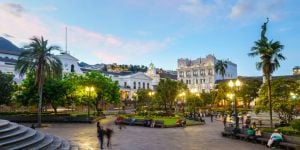
Work in Ecuador
Ecuador is famous as a retirement haven. But you might not want to wait until retirement age to move there and ...

Healthcare in Ecuador
Ecuador, as a fast-developing nation, has laws that are constantly evolving, but one thing is certain: the ongoing ...

Food in Ecuador
What kind of food will you find in restaurants, cafes, and private homes in Ecuador? Many restaurants in Ecuador ...
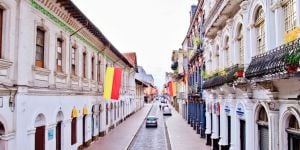
Work in Cuenca
There is no doubt that the Spanish colonial city of Cuenca is a wonderful place to call home, as demonstrated by ...
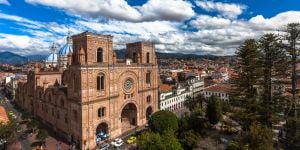
Accommodation in Cuenca
The rose-colored lenses through which potential expats have been made to view Cuenca often blur how the real ...
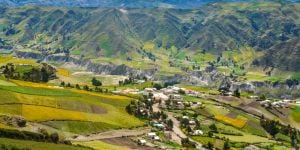
Family and children in Ecuador
Family is everything to an Ecuadorian. The extended family unit is the most important aspect of life in Ecuador, ...
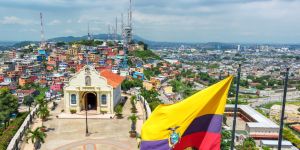
Setting up a business in Ecuador

Discover Ecuador
This article paints a brief picture of Ecuador, a small but complex and diverse Andean country. Although a small ...
Forum topics on leisure in Ecuador



